第六周、第周 英国文学史选读
- 格式:doc
- 大小:43.50 KB
- 文档页数:8
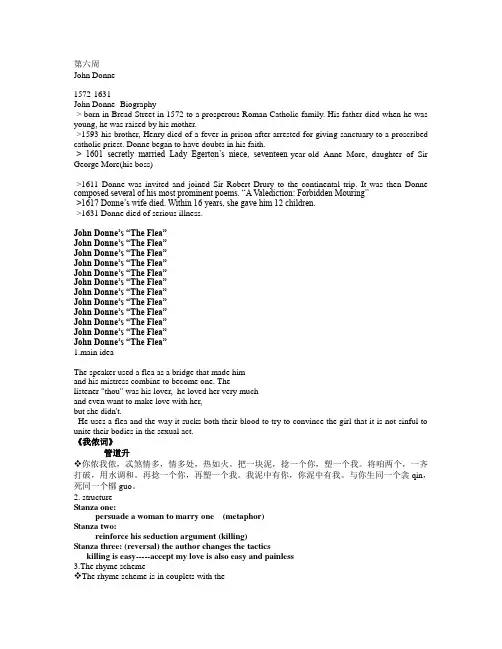
第六周John Donne1572-1631John Donne- Biography-> born in Bread Street in 1572 to a prosperous Roman Catholic family. His father died when he was young, he was raised by his mother.->1593 his brother, Henry died of a fever in prison after arrested for giving sanctuary to a proscribed catholic priest. Donne began to have doubts in his faith.-> 1601 secretly married Lady Egerton’s niece, seventeen-year-old Anne More, daughter of Sir George More(his boss)->1611 Donne was invited and joined Sir Robert Drury to the continental trip. It was then Donne composed several of his most prominent poems. “A Valediction: Forbidden Mouring”->1617 Donne’s wife died. Within 16 years, she gave him 12 children.->1631 Donne died of serious illness.John Donne’s “The Flea”John Donne’s “The Flea”John Donne’s “The Flea”John Donne’s “The Flea”John Donne’s “The Flea”John Donne’s “The Flea”John Donne’s “The Flea”John Donne’s “The Flea”John Donne’s “The Flea”John Donne’s “The Flea”John Donne’s “The Flea”John Donne’s “The Flea”1.main ideaThe speaker used a flea as a bridge that made himand his mistress combine to become one. Thelistener "thou" was his lover, he loved her very muchand even want to make love with her,but she didn't.He uses a flea and the way it sucks both their blood to try to convince the girl that it is not sinful to unite their bodies in the sexual act.《我侬词》管道升❖你侬我侬,忒煞情多,情多处,热如火。
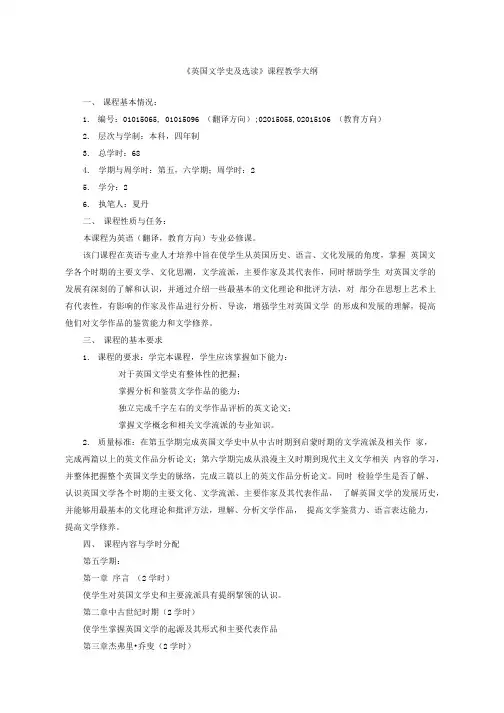
《英国文学史及选读》课程教学大纲一、课程基本情况:1.编号:01015065, 01015096 (翻译方向);02015055,02015106 (教育方向)2.层次与学制:本科,四年制3.总学时:684.学期与周学时:第五,六学期;周学时:25.学分:26.执笔人:夏丹二、课程性质与任务:本课程为英语(翻译,教育方向)专业必修课。
该门课程在英语专业人才培养中旨在使学生从英国历史、语言、文化发展的角度,掌握英国文学各个时期的主要文学、文化思潮,文学流派,主要作家及其代表作,同时帮助学生对英国文学的发展有深刻的了解和认识,并通过介绍一些最基本的文化理论和批评方法,对部分在思想上艺术上有代表性,有影响的作家及作品进行分析、导读,增强学生对英国文学的形成和发展的理解,提高他们对文学作品的鉴赏能力和文学修养。
三、课程的基本要求1.课程的要求:学完本课程,学生应该掌握如下能力:对于英国文学史有整体性的把握;掌握分析和鉴赏文学作品的能力;独立完成千字左右的文学作品评析的英文论文;掌握文学概念和相关文学流派的专业知识。
2.质量标准:在第五学期完成英国文学史中从中古时期到启蒙时期的文学流派及相关作家,完成两篇以上的英文作品分析论文;第六学期完成从浪漫主义时期到现代主义文学相关内容的学习,并整体把握整个英国文学史的脉络,完成三篇以上的英文作品分析论文。
同时检验学生是否了解、认识英国文学各个时期的主要文化、文学流派、主要作家及其代表作品,了解英国文学的发展历史,并能够用最基本的文化理论和批评方法,理解、分析文学作品,提高文学鉴赏力、语言表达能力,提高文学修养。
四、课程内容与学时分配第五学期:第一章序言(2学时)使学生对英国文学史和主要流派具有提纲挈领的认识。
第二章中古世纪时期(2学时)使学生掌握英国文学的起源及其形式和主要代表作品第三章杰弗里•乔叟(2学时)使学生对史诗《贝奥武甫》和杰弗里•乔叟的作品思想内容和艺术特色具有深入认识。
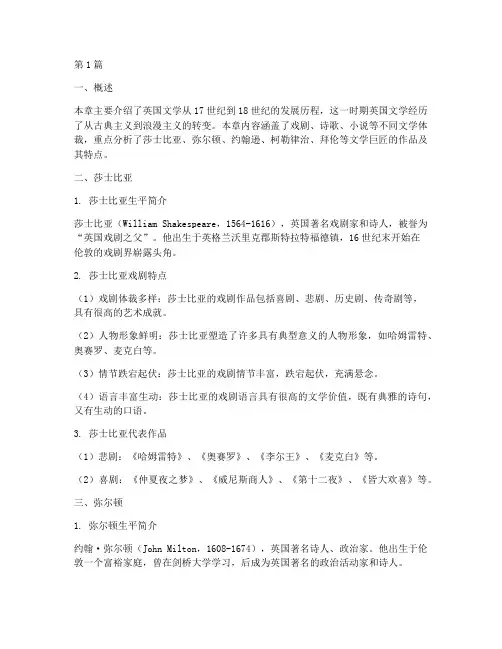
第1篇一、概述本章主要介绍了英国文学从17世纪到18世纪的发展历程,这一时期英国文学经历了从古典主义到浪漫主义的转变。
本章内容涵盖了戏剧、诗歌、小说等不同文学体裁,重点分析了莎士比亚、弥尔顿、约翰逊、柯勒律治、拜伦等文学巨匠的作品及其特点。
二、莎士比亚1. 莎士比亚生平简介莎士比亚(William Shakespeare,1564-1616),英国著名戏剧家和诗人,被誉为“英国戏剧之父”。
他出生于英格兰沃里克郡斯特拉特福德镇,16世纪末开始在伦敦的戏剧界崭露头角。
2. 莎士比亚戏剧特点(1)戏剧体裁多样:莎士比亚的戏剧作品包括喜剧、悲剧、历史剧、传奇剧等,具有很高的艺术成就。
(2)人物形象鲜明:莎士比亚塑造了许多具有典型意义的人物形象,如哈姆雷特、奥赛罗、麦克白等。
(3)情节跌宕起伏:莎士比亚的戏剧情节丰富,跌宕起伏,充满悬念。
(4)语言丰富生动:莎士比亚的戏剧语言具有很高的文学价值,既有典雅的诗句,又有生动的口语。
3. 莎士比亚代表作品(1)悲剧:《哈姆雷特》、《奥赛罗》、《李尔王》、《麦克白》等。
(2)喜剧:《仲夏夜之梦》、《威尼斯商人》、《第十二夜》、《皆大欢喜》等。
三、弥尔顿1. 弥尔顿生平简介约翰·弥尔顿(John Milton,1608-1674),英国著名诗人、政治家。
他出生于伦敦一个富裕家庭,曾在剑桥大学学习,后成为英国著名的政治活动家和诗人。
2. 弥尔顿诗歌特点(1)诗歌题材广泛:弥尔顿的诗歌涉及宗教、政治、哲学等多个领域。
(2)诗歌形式多样:弥尔顿擅长使用史诗、抒情诗、讽刺诗等多种诗歌形式。
(3)语言优美动人:弥尔顿的诗歌语言优美,富有音乐性。
3. 弥尔顿代表作品《失乐园》:这部史诗讲述了亚当和夏娃被逐出伊甸园的故事,揭示了人类罪恶的根源。
四、约翰逊1. 约翰逊生平简介塞缪尔·约翰逊(Samuel Johnson,1709-1784),英国著名文学家、哲学家。
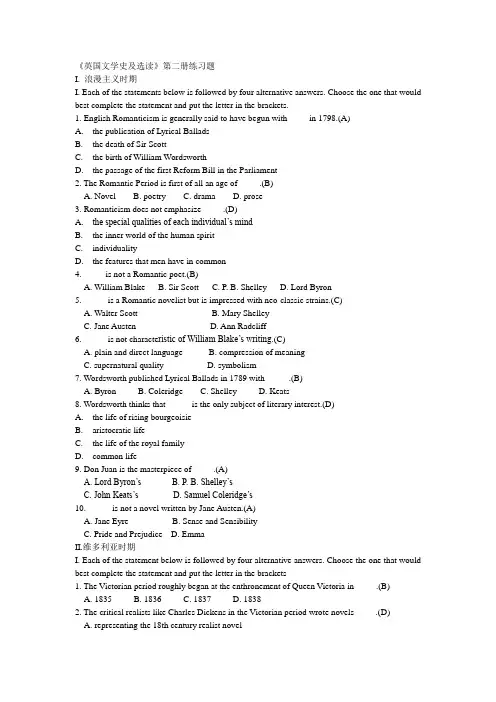
《英国文学史及选读》第二册练习题I. 浪漫主义时期I. Each of the statements below is followed by four alternative answers. Choose the one that would best complete the statement and put the letter in the brackets.1. English Romanticism is generally said to have begun with_____in 1798.(A)A. the publication of Lyrical BalladsB. the death of Sir ScottC. the birth of William WordsworthD. the passage of the first Reform Bill in the Parliament2. The Romantic Period is first of all an age of_____.(B)A. NovelB. poetryC. dramaD. prose3. Romanticism does not emphasize_____.(D)A. the special qualities of each individual’s mindB. the inner world of the human spiritC. individualityD. the features that men have in common4._____ is not a Romantic poet.(B)A. William BlakeB. Sir ScottC. P. B. ShelleyD. Lord Byron5. _____ is a Romantic novelist but is impressed with neo-classic strains.(C)A. Walter ScottB. Mary ShelleyC. Jane AustenD. Ann Radcliff6. _____ is not characte ristic of William Blake’s writing.(C)A. plain and direct languageB. compression of meaningC. supernatural qualityD. symbolism7. Wordsworth published Lyrical Ballads in 1789 with _____.(B)A. ByronB. ColeridgeC. ShelleyD. Keats8. Wordsworth thinks that _____ is the only subject of literary interest.(D)A. the life of rising bourgeoisieB. aristocratic lifeC. the life of the royal familyD. common life9. Don Juan is the masterpiece of_____.(A)A. Lord Byron’sB. P. B. Shelley’sC. John Keats’sD. Samuel Coleridge’s10. _____ is not a novel written by Jane Austen.(A)A. Jane EyreB. Sense and SensibilityC. Pride and PrejudiceD. EmmaII.维多利亚时期I. Each of the statement below is followed by four alternative answers. Choose the one that would best complete the statement and put the letter in the brackets1. The Victorian period roughly began at the enthronement of Queen Victoria in_____.(B)A. 1835B. 1836C. 1837D. 18382. The critical realists like Charles Dickens in the Victorian period wrote novels_____.(D)A. representing the 18th century realist novelB. criticizing the societyC. defending the massE. all the above3. _____is not a Victoria novelist.(D)A. Charles DickensB. George EliotC. William Makepeace ThackerayD. D. H. Lawrence4. _____ is not a work by Charles Dickens.(C)A. Oliver TwistB. David CopperfieldC. MiddlemarchD. A Tale of Two Cities5. Wuthering Heights is a masterpiece written by_____.(B)A. Charlotte BronteB. Emily BronteC. Anne BronteD. Branwell Bronte6. _____ is not Thomas Hardy’s work.(A)A. The Mill on the FlossB. Tess of the D’UrbervillesC. Jude the ObscureD. The Mayor of Casterbridge7. “My Last Duchess” is _____.(A)A. a dramatic monologueB. a short lyricC. a novelD. an essay8. Tennyson’s “Ulysses” gets its inspiration from the following works or writers except_____.(B)A. Homer’s OdesseyB. Joyce’s UlyssesC. DanteD. Greek Mythology9. In the 19th century English literature, a new literary trend _____ appeared. And it flourished in the 1840s and in the early 1950s.(D)A. romanticismB. naturalismC. realismD. critical realism10. The title of the novel Vanity Fair was taken from_____.(A)A. The Pilgrim’s ProgressB. Childe Harold’s PilgrimageC. Gulliver’s TravelsD. The Canterbury TalesIV. Name the author of each of the following literary works.1. The Posthumous Papers of the Pickwick Club (Charles Dickens)2. The Tenant of Wildfell Hall (Anne Bronte)3. In Memoriam (Alfred Tennyson)4. The Mill on the Floss (George Eliot)5. The Return of the Native (Thomas Hardy)VI. For each of the quotations listed below please give the name of the author and the title of the literary work from which it is taken and then briefly interpret it.1. That same evening the gentleman in the white waistcoat most positively and decidedly affirmed, not only that Oliver would be hung, but that he would be drawn and quartered into the bargain. Mr.Bumble shoot his head with gloomy mystery, and said he wished he might come to good; where—unto Mr. Gamfield replied, that he wished he might come to him---which, although he agreed with the beadle in most matters, would seem to be a wish of a totally opposite description. The next morning, the public were once more informed that Oliver Twist was again To Let, and that five pounds would be paid to anybody who would take possession of him.( It is taken from Charles Dickens’s Oliver Twist. This part describes how Oliver is punished for asking for more to eat and how he is therefore sold at three pound ten to a notorious chimney-sweeper. It reveals that the pitiable state of the orphan boy and the cruelty and hypocrisy of the workhouse board.)2. Thus, neither having the clue to the other’s secret, they were respectively puzzled at what each revealed, and awaited new knowledge of each other’s character and moods without attempting to pry into each o ther’s history.Every day, every hour, brought to him one more little stroke of her nature, and to her one more of his. Tess was trying to lead a repressed life, but she little divined the strength of her own vitality.( It is taken from Thomas Hardy’s Tess of the D’Urbervilles. This part describes how Tess forgets about her past misfortune in the beautiful, pastoral dairy farm and unconsciously gives herself up to the attraction of Angel Clare.)III. 现代时期I. Each of the statement below is followed by four alternative answers. Choose the one that would best complete the statement and put the letter in the brackets1. Modernism takes_____as its theoretical base.(C)A. the irrational philosophyB. the theory of psycho-analysisC. both A and BD. neither A nor B2. Modernism rose out of_____.(D)A. skepticismB. disillusion of capitalismC. irrational philosophyD. al the above3. Modernism is, in many aspects, a reaction against_____.(B)A .romanticism B. realismC. post-modernismD. all the above4. _____is not a movement in the modern period.(C)A. “the Angry Young Men”B. “the Beat Generation”C. “the Lost Generation”D. “the Theater of the Absurd”5. _____ is not a representative figure i n applying the technique of “the stream of consciousness” in his/her writing.(A)A. D. H. LawrenceB. James JoyceC. Virginia WoolfD. Dorothy Richardson6. Waiting for Godot is regarded as the most famous and influential play of the Theater of Absurd. It is written by_____.(B)A. George Bernard ShawB. Samuel BeckettC. John GalsworthyD. Eugene O’ Neill7. The Waste Land is_____’s most important single poem.(D)A. Ezra PoundB. William Butler YeatsC. Alfred TennysonD. T. S. Eliot8. _____ is not D. H. Lawrence’s work.(A)A. Finnegans WakeB. Sons and LoversC. Lady Chatterley’s LoverD. The Rain Bow9. _____ is not James Joyce’s novel.(C)A. UlyssesB. A Portrait of the Artist as a Young ManC. DublinersD. Finnegans Wake10. “The Love Song of J. Alfred Prufrock” is written by_____.(D)A. W. H. AudenB. D. H. LawrenceC. W. B. YeatsD. T. S. EliotIV. Name the author of each of the following literary works.1. Pygmalion (Bernard Shaw )2. “Sailing to Byzantium” (W. B. Yeats)3. Woman in Love (D. H. Lawrence)4. Ulysses (James Joyce)5. The Man of Property (John Galsworthy)VI. For each of the quotations listed below please give the name of the author and the title of the literary work from which it is taken and then briefly interpret it.1. I will arise and go now, for always night and dayI hear lake water lapping with low sounds by the shore;While I stand on the roadway, or on the pavements gray,I hear it in the deep heart’s core.(It is taken from Yeats’s “The lake Isle of Innisfree.” In this poem, Yeats expresses his longing to escape from the city life and to live a secluded life by describing the peaceful, tranquil scene of the lake Isle of Innisfree, a legendary place for hermitage.)2. Now she began to combat in his restless fretting. He still kept up his connexion with Miriam, could neither break free nor go the whole length of engagement. And this indecision seemed to bleed him of his energy. Moreover. His mother suspected him of an unrecognized leaning towards Clara, and, since the latter was a married woman, she wished he would fall in love with one of the girls in a better station of life. But he was stupid, and would refuse to love or even to admire a girl much, just because she was his social superior.(It is taken from D. H. Lawrence’s Sons and Lovers. Paul has love affairs with two girls, Miriam and Clara. But he is so dependent on his mother’s love and help that he fails to achieve a fulfilling relationship with either girl.) English Literature ( Book II)2.William Wordsworth要知道他的“Lyrical Ballads”前言是英国浪漫主义时期开始的标志,也是宣言。

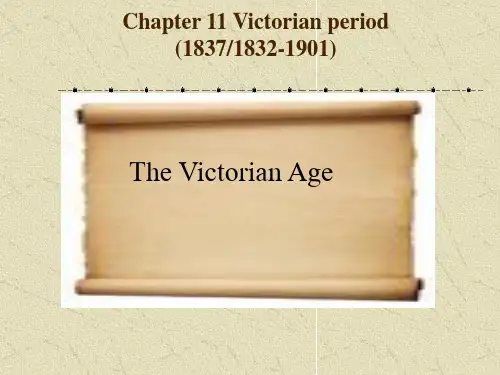
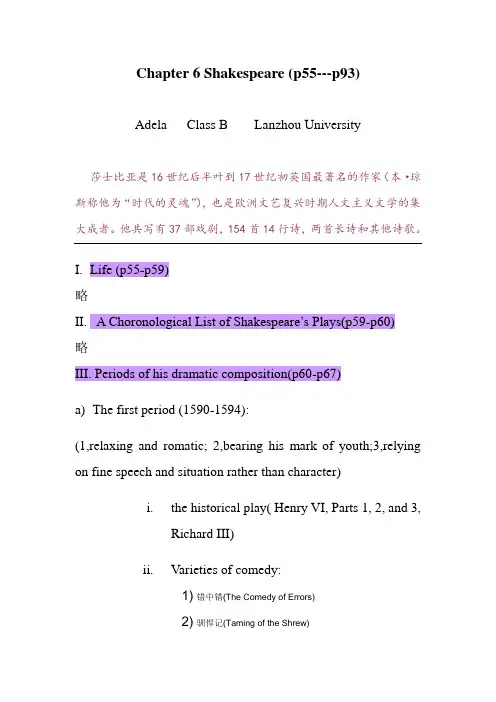
Chapter 6 Shakespeare (p55---p93)Adela Class B Lanzhou University莎士比亚是16世纪后半叶到17世纪初英国最著名的作家(本·琼斯称他为“时代的灵魂”),也是欧洲文艺复兴时期人文主义文学的集大成者。
他共写有37部戏剧,154首14行诗,两首长诗和其他诗歌。
I.Life (p55-p59)略II. A Choronological List of Shakespeare’s Plays(p59-p60)略III. Periods of his dramatic composition(p60-p67)a)The first period (1590-1594):(1,relaxing and romatic; 2,bearing his mark of youth;3,relying on fine speech and situation rather than character)i.the historical play( Henry VI, Parts 1, 2, and 3,Richard III)ii.Varieties of comedy:1) 错中错(The Comedy of Errors)2) 驯悍记(Taming of the Shrew)3) 维洛那二绅士(The Two Gentlemen of Verona)4) 空爱一场(Love's Labour's Lost)Iii. The romatic tragedy:1)罗密欧与朱丽叶(Romeo and Juliet)Iv. Narrative poems:1)维纳斯和阿多尼斯(Venus and Adonis)2)鲁克丽丝失贞记(The Rape of Lucrece)b)The Second Period (1595-1600):(1, optimistic; 2, an advance in characterization and versification, in wisdom, in political insight, in dramatic skill)i. 6 comodies:1) 仲夏夜梦(A Midsummer Night's Dream)2) 威尼斯商人(The Merchant of Venice)3) 温莎的风流夫人(The Merry Wives of Windsor)4) 无事生非(Much Ado About Nothing)5) 如愿(As You Like It)6) 第十二夜(Twelfth Night or What You Will)ii. 5 histotrical plays:1) 理乍得二世(Richard II)2) 亨利四世,第一卷(Henry IV, part 1)3)亨利四世,第二卷(Henry IV, part 2)4)亨利六世,第一卷(Henry VI, part 1)5)约翰国王(King John)iii. A Roman tragedy:1)朱利阿斯·西撒(Julius Caesar)iv.His sonnets(1590-1600),即课本中的前两个时期:这时期的伊丽莎白中央主权尚属巩固,王室跟工商业者及新贵族的暂时联盟尚在发展,1588年打败西班牙“无敌舰队”后国势大振。
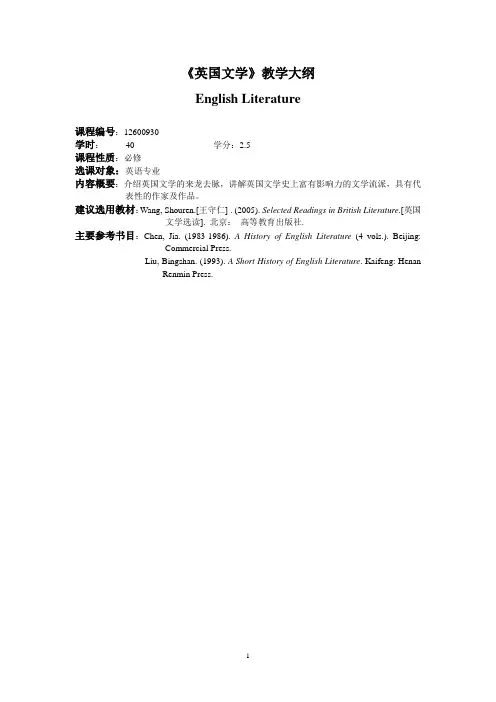
《英国文学》教学大纲English Literature课程编号:12600930学时:40 学分:2.5课程性质:必修选课对象:英语专业内容概要:介绍英国文学的来龙去脉,讲解英国文学史上富有影响力的文学流派,具有代表性的作家及作品。
建议选用教材:Wang, Shouren.[王守仁] . (2005). Selected Readings in British Literature.[英国文学选读]. 北京:高等教育出版社.主要参考书目:Chen, Jia. (1983-1986). A History of English Literature (4 vols.). Beijing:Commercial Press.Liu, Bingshan. (1993). A Short History of English Literature. Kaifeng: HenanRenmin Press.《英国文学》教学大纲学时:40 学分:2.5教学大纲说明一、课程的目的及任务本课程是英语专业高年级学生提高英语语言水平和文化素质的重要课程。
它旨在让学生通过对英国文学史及重要作家和代表作品的学习,了解英国文学发展的基本线索,了解文学传统的继承、借鉴和创新、了解文学流派的产生、发展和演变;理解作家和作品产生的历史的、政治经济的和社会的背景;欣赏代表英国文化传统的优秀作品,以丰富英语语言和文化知识,加强对英语的感受力和语言运用能力,培养文学鉴赏力和分析作品的能力,陶冶情操,提高综合文化素质。
二、课程教学的基本要求本课程在学生具有较扎实的英语语言基础和一定的英美文化背景基础上开设。
本课程以文学史为纲,以作品为基础,采用教师讲授分析作家作品、学生课外阅读与课内检查指导相结合的方式教学。
同时课堂内经常辅导学生对作家和作品进行讨论,课外采用研讨小组(seminar)的形式引导学生对某一专题进行研究讨论,学生在教师的指导下还要独立地对某一作家作品进行全过程的研究:从搜集资料、确定主题到写出评析文章或口头发言,为毕业论文的撰写打下基础。
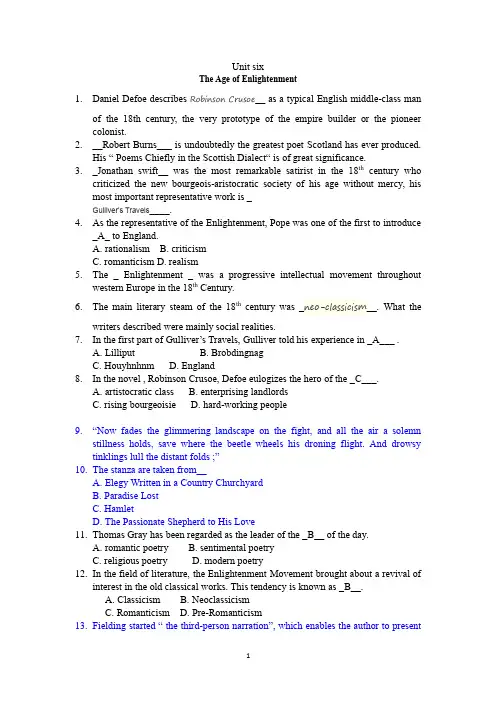
Unit sixThe Age of Enlightenment1.Daniel Defoe describes Robinson Crusoe__ as a typical English middle-class manof the 18th century, the very prototype of the empire builder or the pioneer colonist.2.__Robert Burns___ is undoubtedly the greatest poet Scotland has ever produced.His “ Poems Chiefly in the Scottish Dialect“ is of great significance.3._Jonathan swift__ was the most remarkable satirist in the 18th century whocriticized the new bourgeois-aristocratic society of his age without mercy, his most important representative work is _Gulliver's Travels____.4.As the representative of the Enlightenment, Pope was one of the first to introduce_A_ to England.A. rationalismB. criticismC. romanticismD. realism5.The _ Enlightenment _ was a progressive intellectual movement throughoutwestern Europe in the 18th Century.6.The main literary steam of the 18th century was _neo-classicism__. What thewriters described were mainly social realities.7.In the first part of Gulliver’s Travels, Gulliver told his experience in _A___ .A. LilliputB. BrobdingnagC. HouyhnhnmD. England8.In the novel , Robinson Crusoe, Defoe eulogizes the hero of the _C___.A. artistocratic classB. enterprising landlordsC. rising bourgeoisieD. hard-working people9.“Now fades the glimmering landscape on the fight, and all the air a solemnstillness holds, save where the beetle wheels his droning flight. And drowsy tinklings lull the distant folds ;”10.The stanza are taken from__A. Elegy Written in a Country ChurchyardB. Paradise LostC. HamletD. The Passionate Shepherd to His Love11.Thomas Gray has been regarded as the leader of the _B__ of the day.A. romantic poetryB. sentimental poetryC. religious poetryD. modern poetry12.In the field of literature, the Enlightenment Movement brought about a revival ofinterest in the old classical works. This tendency is known as _B__.A. ClassicismB. NeoclassicismC. RomanticismD. Pre-Romanticism13.Fielding started “ the third-person narration”, which enables the author to presentas the ___ not only the characters’ external behaviors but also the internal workings of their minds.A. truthful observerB. all-knowing GodC. Intimate particularD. scrutinizing critic14.Which of the following phrased cannot be used to describe the features of Gray’spoetry.A. Highly artificial in dictionB. Distorted in word orderC. Calculated in rhythm.D. Lighted-hearted in tone.15.The following on Daniel Defoe are true except _C__.A. Robinson Crusoe is his first novelB. Robinson Crusoe is universally considered his masterpieceC. he was a member of the upper classD. in his novels, his sympathy for the downtrodden, unfortunate poor is shown。
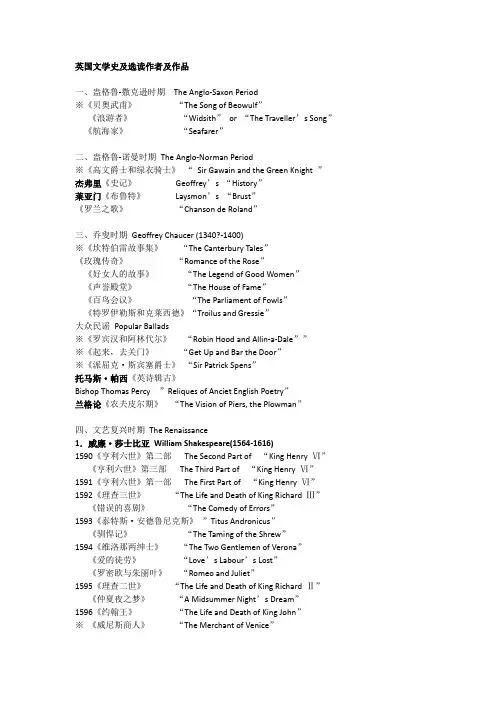
英国文学史及选读作者及作品一、盎格鲁-撒克逊时期The Anglo-Saxon Period※《贝奥武甫》“The Song of Beowulf”《浪游者》“Widsith”or “The Traveller’s Song”《航海家》“Seafarer”二、盎格鲁-诺曼时期The Anglo-Norman Period※《高文爵士和绿衣骑士》“Sir Gawain and the Green Knight ”杰弗里《史记》Geoffrey’s “History”莱亚门《布鲁特》Laysmon’s “Brust”《罗兰之歌》“Chanson de Roland”三、乔叟时期Geoffrey Chaucer (1340?-1400)※《坎特伯雷故事集》“The Canterbury Tales”《玫瑰传奇》“Romance of the Rose”《好女人的故事》“The Legend of Good Women”《声誉殿堂》“The House of Fame”《百鸟会议》“The Parliament of Fowls”《特罗伊勒斯和克莱西德》“Troilus and Gressie”大众民谣Popular Ballads※《罗宾汉和阿林代尔》“Robin Hood and Allin-a-Dale””※《起来,去关门》“Get Up and Bar the Door”※《派屈克·斯宾塞爵士》“Sir Patrick Spens”托马斯·帕西《英诗辑古》Bishop Thomas Percy ”Reliques of Anciet English Poetry”兰格论《农夫皮尔期》“The Vision of Piers, the Plowman”四、文艺复兴时期The Renaissance1.威廉·莎士比亚William Shakespeare(1564-1616)1590《亨利六世》第二部The Second Part of “King Henry Ⅵ”《亨利六世》第三部The Third Part of “King Henry Ⅵ”1591《亨利六世》第一部The First Part of “King Henry Ⅵ”1592《理查三世》“The Life and Death of King Richard Ⅲ”《错误的喜剧》“The Comedy of Errors”1593《泰特斯·安德鲁尼克斯》”Titus Andronicus”《驯悍记》“The Taming of the Shrew”1594《维洛那两绅士》“The Two Gentlemen of Verona”《爱的徒劳》“Love’s Labour’s Lost”《罗密欧与朱丽叶》“Romeo and Juliet”1595《理查二世》“The Life and Death of King Richard Ⅱ”《仲夏夜之梦》“A Midsummer Night’s Dream”1596《约翰王》“The Life and Death of King John”※《威尼斯商人》“The Merchant of Venice”1597《亨利四世》第一部The First Part of “King Henry Ⅳ”《亨利四世》第二部The Second Part of “King Henry Ⅳ”1598《无事生非》“Much Ado About Nothing”《温莎的风流娘儿们》”The Merry Wives of Windsor”《亨利五世》”The Life of King Henry Ⅴ”1599《尤利乌斯·凯撒》“The Life and Death of Julius Caesar”《皆大欢喜》”As You Like It”1600《第十二夜》“Twelfth Night ,or, What You Will”※1601《哈姆雷特》“Hamlet, Prince of Denmark”1602《特洛伊洛斯与克瑞西达》“Troilus and Cressida”《终成眷属》“All’s Well That Ends Well”1604《一报还一报》“Measure for Measure”《奥塞罗》“Othello, the Moore of Venice”1605《李尔王》”King Lear”《麦克白》“The Tragedy of Macbeth”1606《安东尼和克莉奥佩特拉》“Antony and Cleopatra”1607《科里奥拉鲁斯》”The Tragedy of Coriolanus”《雅典的泰门》“Timon of Athens”1608《佩里克利斯》“Pericles, Prince of Tyre”1609《辛白林》“Cymbeline, King of Britain”1610《冬天的故事》“The Winter’s Tale”《暴风雨》“The Tempest”《亨利八世》“The Life of King Henry Ⅷ”Poems《维纳斯与阿多尼斯》“Venus and Adonis”《露克丽丝受辱记》“Lucrece”※《十四行诗》“Sonnets”2。
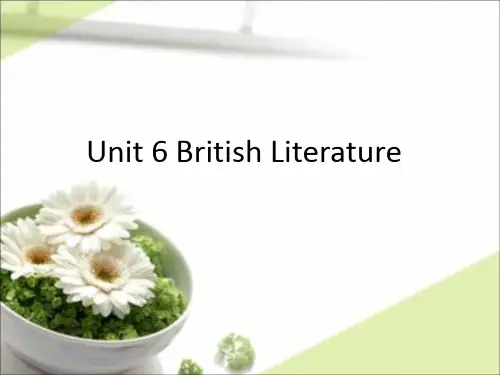
《英国(yīnɡɡuó)文学史及选读》教学大纲课程(kèchéng)编码:071202总学时数:144一、课程性质、目的(mùdì)和要求通过(tōngguò)对英国文学史及选读的重点作家、作品的系统学习,学生应达到(dá dào)下列要求1.初步获得英国文学史的基础知识,掌握各历史时期文学发展的概况及特征,对有代表性作家的重要作品的思想性和艺术性有初步了解。
2.通过对各历史时期代表作家重要作品片段的学习,对各时期的文学思潮、流派及主要作家的写作风格和语言艺术有初步了解,从而提高对英语文学作品的鉴赏力,提高语言水平,更好地完成中学英语教育任务。
3.能以马列主义文艺理论的基本观点分析和评价作家和作品。
二、教学内容、要点与课时安排1.文艺复兴时期的文学。
2.十八世纪现实主义小说。
3.浪漫主义诗歌。
4.十九世纪批判现实主义小说。
5.现代主义文学。
本课程在第一学年开设,第一学期18周,每周4课时,第二学期18周,每周4课时,总计144课时。
各章节的教学内容、要点安排和具体课时安排如下:第一学期 72课时第一章古英语和中古时期的英国文学 12课时教学主题:古英语和中古时期的英国文学教学要点:盎格鲁—撒克逊时期的文学特征;英雄史诗Beowulf的故事(gùshì)内容和诗体特征。
1.盎格鲁—诺曼时期的文学特征;骑士文学的发展(fāzhǎn)概况,主题和类别;骑士故事(gùshì)“Sir Gawain and Green Knight”的故事(gùshì)内容。
2.十四世纪英国文学概况(gàikuàng);William Langland的长诗“Piers thePlowman”的思想内容及其社会意义; Geoffrey Chaucer的文学成就;乔叟的代表作The Canterbury Tales的内容简介和社会意义;学习The Canterbury Tales中的片段。
外交学院大一英语课程表第一学期课程代码课程名称周数周学时总学时学分课程性质备注经典深读(1)174684专业必修英语报刊选读(1)174684专业必修高级语音172342专业必修口译听力(1)172342专业必修英语口语1(外)174684专业必修英语写作(记叙文与说明文)172342专业必修大学语文172342公共必修+39思想道德修养与法律基础172342公共必修大学生发展规划172342公共必修国防教育171341公共必修体育(一)171341公共必修体育选修课,每学期1学分。
信息技术应用基础172342公共必修每周2课时上机操作,学生必修。
形式与政策教育2公共必修不占课时,但学生在1-4学期须参加“外交学院论坛”、“外交学院讲座”等形式报告和专题讲座,由辅导员负责记考勤。
第四学期期末,学生提交一篇论文,由基础部评阅。
社会实践1实践教学社会实践、社会调查和实践活动学生可任选其一,记1学分。
(在第一至第七学期间完成即可)社会调查实践活动军训1实践教学第二学期课程代码课程名称周数周学时总学时学分课程性质备注经典深读(2)184724专业必修英语报刊选读(2)182362专业必修口译听力(2)182362专业必修英语口语2(外)182362专业必修英语写作(论说文)182362专业必修英国概况182362专业必选英语词汇与文化182362专业限选英语高级语法182362专业限选人文经典阅读182362专业限选应用文写作18 2 36 2 公共必修中国近现代史纲要18 2 36 2 公共必修体育(二)18 1 38 1 公共必修体育选修课,每学期1学分。
数据库Visual Foxpro18 2 36 2 公共必修 每周2课时上机操作,学生必修。
从第二学期起至第七学期止, (1)需要修满艺术选修课2学分;(2)艺术团活动,由团委负责考勤、考核,每学年计1分; (3)需要修满文化素质选修课6学分;(4)体育选修课每学期1学分。
《英国文学史及选读》.doc
英国文学史及选读,是英国一门著名的文学课程,也是一部经典作品。
它是一部深入
浅出、精睿细腻、全面涵盖的英国文化史,囊括英国近代文学发展脉络,英国文学各时
期最重要的文学作家及作品介绍,从古典文学到浪漫主义文学,正反映了英国文学历史的
变化和发展。
该书的结构紧凑,内容丰富,包括英国人文精神的不同阶段及其代表作家,从古典时
期的莎士比亚到浪漫主义时期的济慈;英国文学发展历史,如抒情主义、自然主义等;英
国文学发展和美学构建的不同时代,从古典文学范式到现代文学范式;文体及技巧;英国
文学作家作品及其研究,如莎士比亚的作品《仲夏夜之梦》、济慈的《傲慢与偏见》,小
说家傅抱石的《兰贝斯特传奇》;英国文学史的主要文本及次要文本的研究,如英国神话、文艺复兴时期的《外乡人》,乔叟的《泶州记事》,英国维多利亚时代的《半口兽语》等。
另外,还有英国文学的传统观念,如文明观念、民族观念、社会观念,宗教观念等,
以及英国文学史上最重要、最有影响力的文学作家,以及他们从事的不同类型文学创作。
以上就是英国文学史及选读对英文文学史发展及特殊文学作家和作品节选以及有关英
国文化史的全面概述。
通过阅读本书,读者可以更深入地了解英国文学史,更好地理解英
国文学及文化发展的历史性、文体性以及要素,拓展文化视野,陶冶人文情怀。
第六周John Donne1572-1631John Donne- Biography-> born in Bread Street in 1572 to a prosperous Roman Catholic family. His father died when he was young, he was raised by his mother.->1593 his brother, Henry died of a fever in prison after arrested for giving sanctuary to a proscribed catholic priest. Donne began to have doubts in his faith.-> 1601 secretly married Lady Egerton’s niece, seventeen-year-old Anne More, daughter of Sir George More(his boss)->1611 Donne was invited and joined Sir Robert Drury to the continental trip. It was then Donne composed several of his most prominent poems. “A Valediction: Forbidden Mouring”->1617 Donne’s wife died. Within 16 years, she gave him 12 children.->1631 Donne died of serious illness.John Donne’s “The Flea”John Donne’s “The Flea”John Donne’s “The Flea”John Donne’s “The Flea”John Donne’s “The Flea”John Donne’s “The Flea”John Donne’s “The Flea”John Donne’s “The Flea”John Donne’s “The Flea”John Donne’s “The Flea”John Donne’s “The Flea”John Donne’s “The Flea”1.main ideaThe speaker used a flea as a bridge that made himand his mistress combine to become one. Thelistener "thou" was his lover, he loved her very muchand even want to make love with her,but she didn't.He uses a flea and the way it sucks both their blood to try to convince the girl that it is not sinful to unite their bodies in the sexual act.《我侬词》管道升❖你侬我侬,忒煞情多,情多处,热如火。
把一块泥,捻一个你,塑一个我。
将咱两个,一齐打破,用水调和。
再捻一个你,再塑一个我。
我泥中有你,你泥中有我。
与你生同一个衾qin,死同一个槨guo。
2. structureStanza one:persuade a woman to marry one (metaphor)Stanza two:reinforce his seduction argument (killing)Stanza three: (reversal) the author changes the tacticskilling is easy-----accept my love is also easy and painless3.The rhyme scheme❖The rhyme scheme is in couplets with thefinal line in each stanza rhyming with thefinal couplet.❖The rhyming pattern is AABBCCDDD4.questions❖1. Why does the poet say that "this cannot be saida sin, or shame, or loss of maidenhead"?The speaker tells his beloved to look at the flea before them and to note "how little" is that thing that she denies him. For the flea, he says, has sucked first his blood, then her blood, so that now, inside the flea, they are mingled; and that mingling cannot be called "sin, or shame, or loss of maidenhead." The flea has joined them together in a way that, "alas, is more than we would do."❖2. What do you think is the addressee'sparents' attitude toward the poet's wooing?The addressee's parents' attitude are against him. (...Though parents grudge...)❖3. What is the real purpose of the poet to say that in killing the flea "thou" are actually killing three lives?He compares the killing of the flea to murder. It would be “three sins in killing three” (l. 18) since he and his lover would be killed within the flea if she were to follow her natural tendency to dispose of the insect. He even states that the act of killing the flea would be “sacrilege”. This is a term that is generally applied to acts that go against religion. If the lover denies the fact that their blood, and therefore their lives, are contained within the flea, it is similar to committing an irreligious act. This would seem to make the reverse, to acknowledge their closeness within the flea, compatible with religion. To acknowledge this closeness is also to acknowledge that it is allowable, which could lead to the conclusion that Donne wishes his lover to arrive at: she should give in to his desires because there is nothing wrong with the intimate mingling of two people.Death, Be Not Proud1 Death be not proud, though some have called theeMighty and dreadful, for, thou art not so,For, those, whom thou think’st, thou dost overthrow,Die not, poor death, nor yet canst thou kill me;From rest and sleep, which but thy pictures be,Much pleasure, then from thee, much more must flow,And soonest our best men with thee do go,Rest of their bo nes, and soul’s delivery.Thou art slave to fate, chance, kings, and desperate men,And dost with poison, war, and sickness dwell,And poppy, or charms can make us sleep as well,And better than thy stroak; why swell’st thou then?One short sleep past, we wake eternally,And death shall be no more; Death, thou shalt die.死神,你莫骄傲❖❖死神,你莫骄傲,尽管有人说你❖如何强大,如何可怕,你并不是这样;❖你以为你把谁谁谁打倒了,其实,❖可怜的死神,他们没死;你现在也还杀不死我。
❖休息、睡眠,这些不过是你的写照,❖既能给人享受,那你本人提供的一定更多;❖我们最美好的人随你去得越早,❖越能早日获得身体的休息,灵魂的解脱。